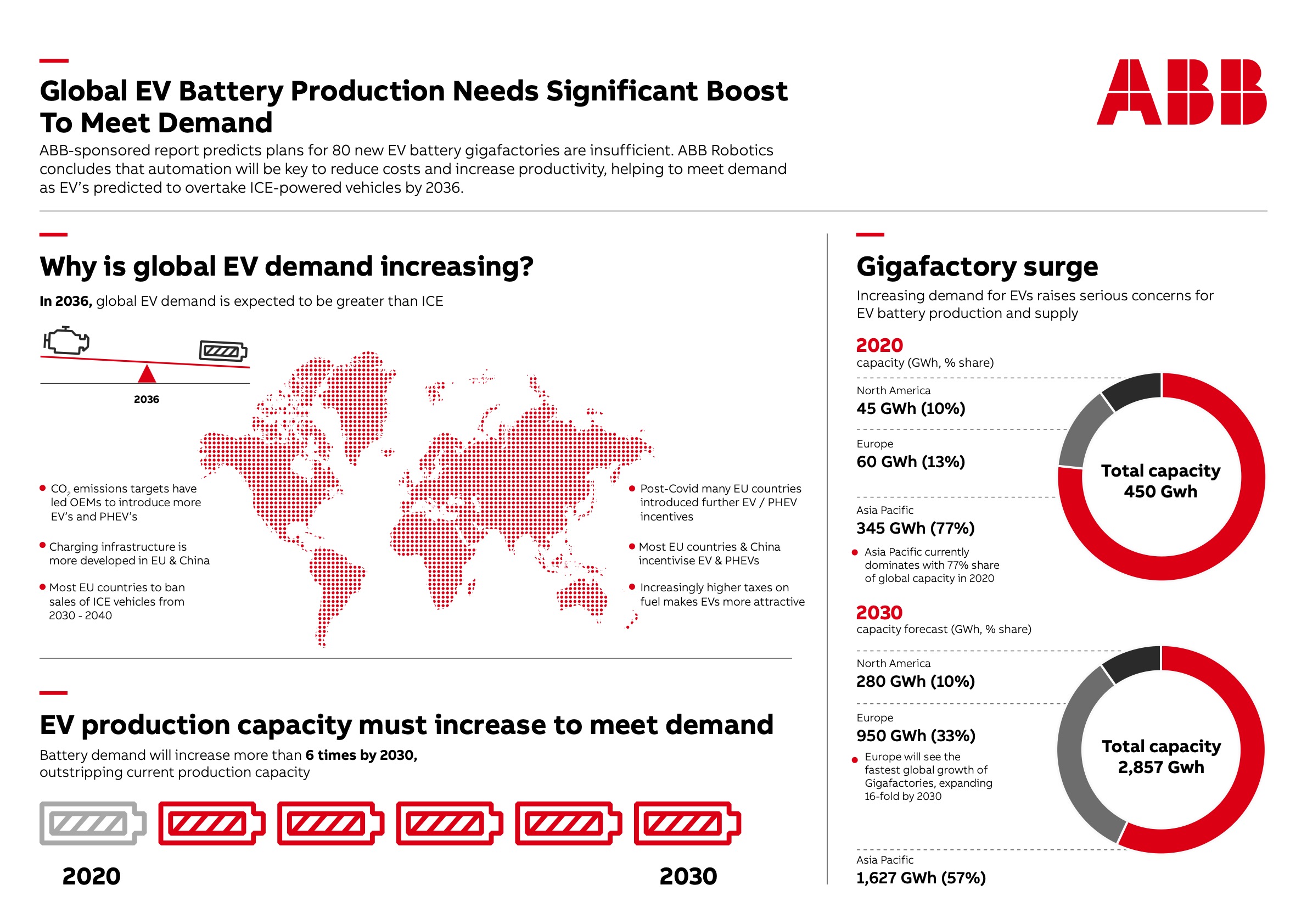Global EV battery production needs ‘significant boost’ to meet growing global demand
An ABB-sponsored report predicts that plans for 80 new electric vehicle battery gigafactories will be “insufficient” and that battery production needs a “significant boost” to meet growing global demand.
The report highlights role of automation in meeting demand as EVs are predicted to overtake internal combustion engine-powered vehicles by 2036.
According to the Electric Vehicle Battery Supply Chain Analysis, sponsored by ABB Robotics and authored by the automotive intelligence unit of Ultima Media, while 2036 is the changeover year when all-electric passenger vehicles are predicted to overtake sales of ICE-equipped equivalents, concerns over EV battery supply to meet the escalation in demand poses serious risk to the growth of electricity as a clean propulsion fuel, despite plans for 80 new global battery gigafactories.
The report outlines that although Asia leads electric vehicle battery production, Europe will make up vital ground over the next few years while US manufacturers are also planning increases in capacity.
Tanja Vainio, managing director of ABB Robotics’ auto Tier 1 business line, says: “Automation is key to increasing assembly safety, quality and traceability and delivering battery technologies cost effectively, which is critical to the expansion of electric vehicles.”
“With production speed and flexibility essential to the successful scale-up of the EV battery industry, our cellular production architecture enables manufacturers to quickly validate a cell design and then roll out production cells globally with uniform quality, safety and productivity standards. Roll-outs can be scaled to demand with the flexibility to adjust capacity in real time.”
The report’s researchers point to the importance of battery pack assembly being located close to or within car assembly facilities.
Vainio says: “Co-locating battery pack assembly not only boosts sustainability by reducing transportation, it increases flexibility.
“A cellular approach to production is easily integrated alongside existing lines. If the demand curve moves, cells can be added or removed quickly to maintain accurate production scale.
“Our robots are designed to be quickly repurposed as needed, boosting flexibility and adding to our sustainable approach by maximizing the life of each robot we build.”
Vainio adds: “We believe that building a robust battery supply chain will create a distinct competitive advantage for OEMs, setting a trend towards maximum production flexibility, whether battery pack production is insourced or outsourced, to further reduce costs and boost productivity.”
The high price of EVs will increasingly create a barrier to further market penetration, reducing vehicle cost has therefore become a whole-industry focus. Given that the battery represents up to a third of vehicle costs, ABB is focused on solutions that improve battery manufacturing productivity.
Vainio says: “Increasingly we see that higher productivity and lower costs are driven by assembling battery cells straight into packs.
“ABB is working in partnership with a number of manufacturers, using its systems and knowledge to increase productivity, quality and safety levels, as well as reduce finished pack costs through automated assembly – vital if EVs are to meet their required cost and adoption targets.”
The Electric Vehicle Battery Supply Chain Analysis report examines the current and future state of EV battery supplies – sources of materials, technologies available, demand analysis and potential risks.


